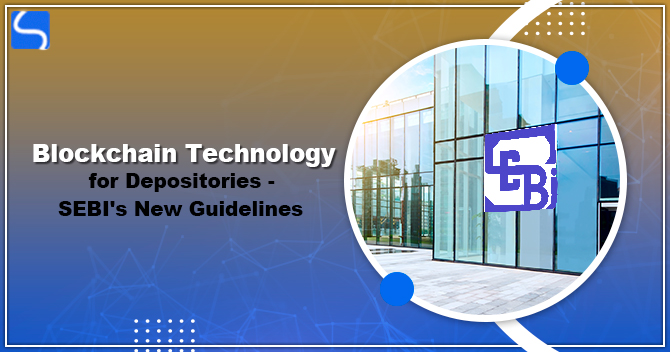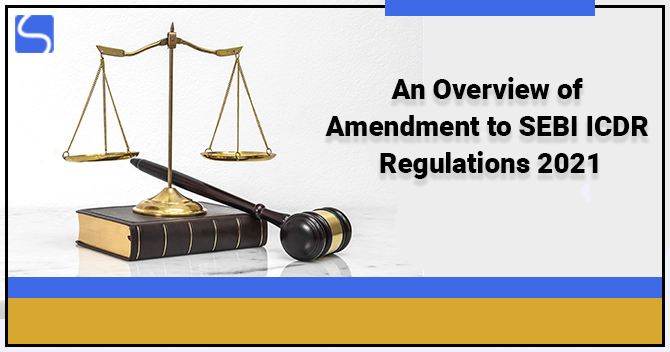Blockchain Technology for Depositories – SEBI’s New Guidelines

Karan Singh | Updated: Aug 26, 2021 | Category: SEBI Advisory
The SEBI or Securities & Exchange Board of India has asked depositories, TAI (Trustees Association of India), and Stock Exchanges to create, maintain, and host a system that uses DLT or Distributed Ledger Technology or Blockchain Technology for depositories, to monitor and record the creation of securities as well as to monitor the covenants of non-convertible securities. The system will come into action from 1st April 2022, but testing of the system will start from 1st January 2022. In this blog, we will discuss the SEBI’s guidelines for the usage of Blockchain Technology for Depositories.
Based on the suggestions of various authorities & other official bodies, SEBI has been instructed to implement the process for creating a platform that will be beneficial for observing covenant supervising and for different security purposes for the depositories who will be using the SEBI’s services.
Table of Contents
What is Blockchain Technology?
Before we discuss the SEBI’s guidelines for the usage of Blockchain Technology for depositories, it’s important to know the meaning of Blockchain Technology. Blockchain is mentioned as Distributed Ledger Technology, which makes the history of any digital asset unalterable and clears through the use of cryptographic & decentralisation hashing.
This technology is simply defined as a decentralised, distributed ledger that records the origin of a digital asset. By inherent design, the data on a blockchain is not able to be changed, which makes it a legal disruptor for industries such as cybersecurity, payments, and healthcare.
According to the Hindustan Times report, the Indian Government has currently said that it has used Blockchain Technology that is mostly used by cryptocurrencies, to certify Indian start-ups digitally. Blockchain Technology powered certificate verifying platform has been created by the DPIIT (Department for Promotion of Industry and Internal Trade). The platform will be capable of aiding the Government to disburse Rs. 10,000 crores from Fund of Funds for start-ups to provide incentives to start-ups as well.
In July 2021, it was observed that the Central Government is eyeing to create a blockchain platform that would aid the Government Departments, investors, banks, and PSUs to confirm the authenticity of the information submitted by start-ups in India. Previous reports have suggested that the Indian Government is looking to create a platform that would come up with the roadmap for regulations and the use of blockchain in India.
What is Depository?
It refers to a company or a place that holds financial securities in a dematerialised form. An organisation, bank or any institution holding & helping in security trading is referred to as a depository. The account of depository holds securities in the same manner that bank accounts hold funds.
A depository can be a place also where something is held for protection or storage. Hence, a depository can be an institution, a construction or a warehouse that enables businesses and individuals to deposit any valuable asset for protecting. TheThe money deposited in a depository is used for investing in some other securities & lending to other people or businesses; hence, for providing liquidity in the exchange market. After understanding the meaning of Blockchain Technology and Depository, let’s understand the whole background of SEBI’s guidelines for the usage of Blockchain Technology for Depositories.
Background of Blockchain Technology for Depositories – SEBI’s Guidelines
SEBI has proposed the construction of platform security and covenant monitoring a system hosted by depositories as per the suggestions. Blockchain Technology for depositories can be combined into various sectors. The primary use of this technology is as a distributed ledger for cryptocurrencies like bitcoin; there were also some other operational products that had matured from proof of concept by the end of 2016.
Interest, asset cover & covenants, security creation, redemption payment of credit rating information, non-convertible securities, and regularly monitoring or observing security cover, covenants, and asset cover will be recorded by the system.
Depositories should provide secure login credentials to issuers, CRAs (Credit Rating Agencies), DTs (Debenture Trustees), and others for recording & verifying necessary information on the system and put in place enough protections to make sure the reliability & security of the data on the system as per the directive. They have also been told to exchange information with the other depository for the objective of combining and maintaining a compatible system.
Depositories will also need to create an alert system that will be offered to stakeholders for information submission, acceptance & rejection, as well as notifications for periodic & event-based compliances.
Moreover, if the issuer fails to inform the DT(s) of the status of interest payment or redemption amount, the DT(s) will have to inquire of the issuer or perform an independent evaluation (from investors, banks, etc.) to determine the same.
Based on such assessment, DT(s) shall update in the system the payment status of non-convertible securities within seven working days of interest payment becoming due to nine working days of the maturity or redemption date SEBI[1] said.
Conclusion
After discussing the SEBI’s notification regarding the usage of Blockchain Technology for Depositories, it is cleared that it is necessary to create a blockchain-based platform to monitor and record the creation of securities as well as to monitor the covenants of non-convertible securities. The platform will be capable of aiding the Government to disburse Rs. 10,000 crores from Fund of Funds for start-ups to provide incentives to start-ups as well.
Read our article:How to Differentiate Enterprise Value and Equity Value? – An Overview














